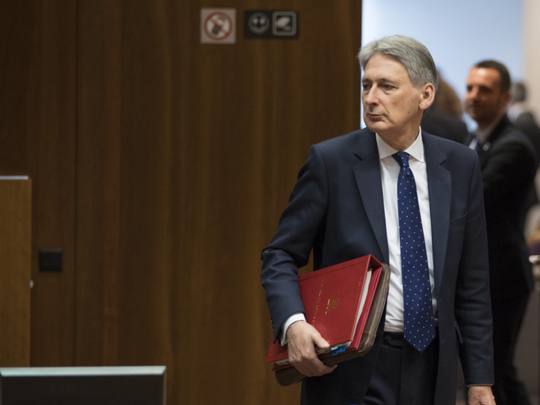
BRUSSELS: Britain’s finance chief has refused to rule out the possibility that the country may continue paying into European Union coffers for access to the single market after leaving the bloc.
In a rare appearance for the regular meeting of the EU’s 28 finance ministers, Philip Hammond stressed Tuesday that he wants to minimise the economic disruption from Britain’s exit. Leaving the EU single market would be a blow to many British businesses that would face new tariffs on trade.
“I think that it’s in everybody’s interest on both sides of the English Channel to have a smooth a process as possible that minimises the threat to European financial stability and minimises the disruption to the very many complex relationships that exist between European manufacturing businesses and their financing banks and so on in London,” he said.
That, he conceded, may include ongoing contributions to the EU budget after so-called Brexit.
In terms of any future contributions to particular organisations, Hammond said “we would look at what was on offer, we would look at the cost, and as you do with anything we would decide if that was a good deal or not.”
Britain has yet to begin negotiations with the EU about Brexit and what the country’s future relationship with its main trading partner will look like. Discussions can only begin once Prime Minister Theresa May’s government triggers Article 50 of the EU treaty, which formally kick-starts a two-year exit timetable.
Her hope had been to invoke Article 50 by the end of March without the approval of lawmakers, but a court decided last month that Parliament had to give its backing to such a move. The government is contesting that ruling in the Supreme Court, the highest court. Should it confirm that Parliament has to be involved, it could delay May’s plans to begin the exit discussions.
Later Tuesday, the EU’s chief Brexit negotiator, Michel Barnier, is set to make his first detailed statement on Britain’s departure from the EU since he took up the role in October. He is expected to repeat that discussions can’t start until the formal process has been launched.
Though there’s been a degree of understanding across European capitals about the constitutional arrangements that have to play out in Britain, there’s also been discontent over the approach the British government has taken so far. One idea that’s vexed politicians in Europe is that Britain can “have its cake and eat it,” - that it can still have access to the single market while applying stricter immigration controls. The EU stresses that the freedoms of trade, money and people are inseparable and a country cannot pick and choose.
Jeroen Dijsselbloem, the Dutch finance minister who also chairs meetings of the 19 EU countries that use the euro, said that the proposals he’s seen so far “are incompatible with smooth and incompatible with orderly.”
“It can be smooth and it can be orderly but it requires a different attitude on the part of the British government,” he said. “If the UK wants to have full access to the internal market they will have to accept the rules and regulations that go with that internal market.”












